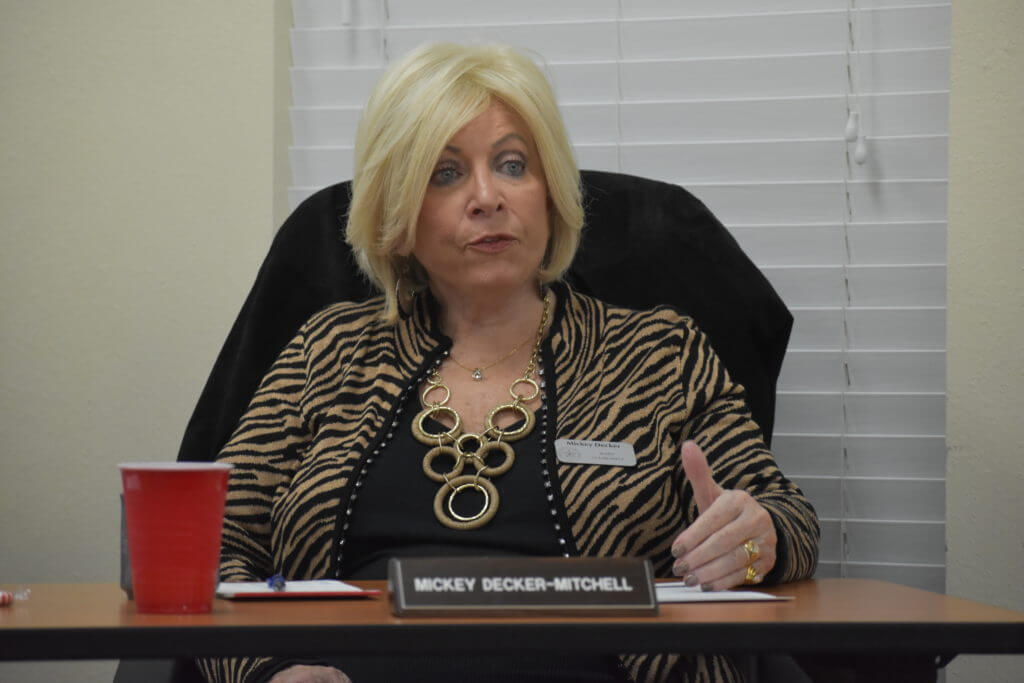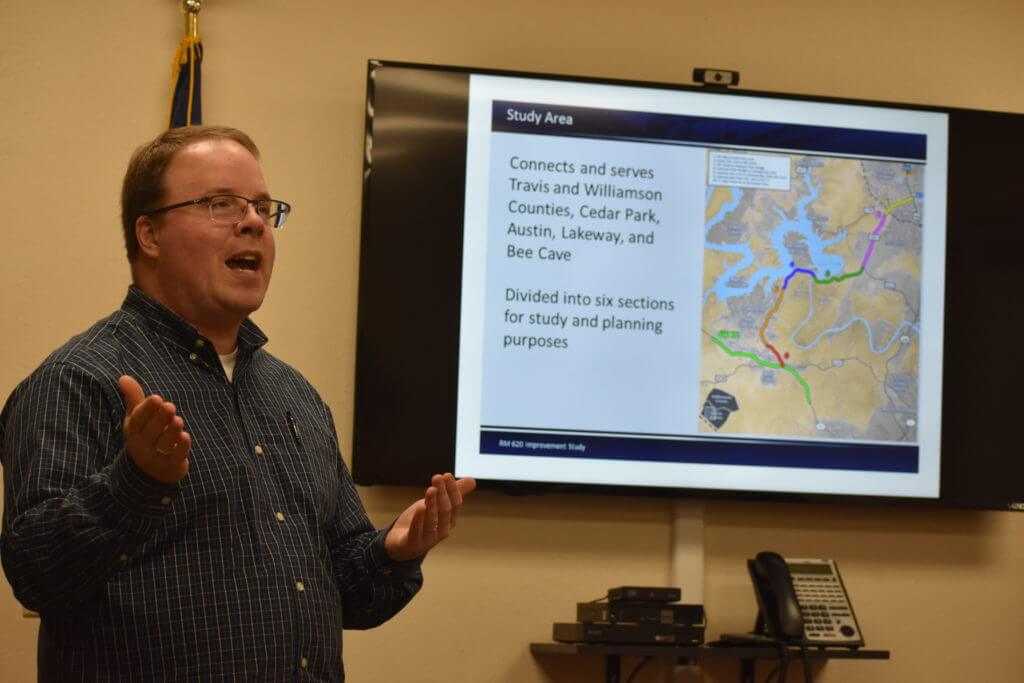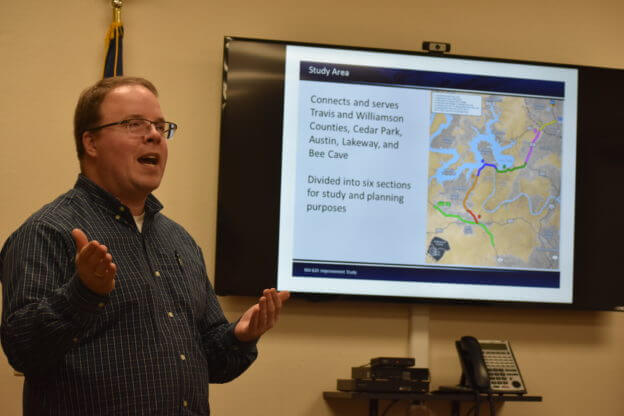
Mickey Decker-Mitchell, WCID 17 board vice president, responds to a customer’s question regarding the need for a $5 monthly fee added to district bills.
District GM says fees go toward RM 620 roadwork
By LESLEE BASSMAN, Four Points News
Residents within the jurisdiction of Water Control and Improvement District 17 are slated to see a $5 fee on their next billing cycle in January, a charge that will remain on district bills for the next six years.
During a Dec. 7 town hall meeting at its offices, 3812 Eck Lane, Austin, WCID 17 General Manager Jason Homan said board members enacted the charge, labeled as TxDOT 620 Fee, as a result of the district’s costs to move its water and wastewater lines in conjunction with Texas Department of Transportation’s project to improve RM 620. TxDOT completed a feasibility study this spring that showed improvements to the roadway were necessary to decrease vehicle accidents and improve travel time as well as quality of life for area residents, he said.
Utility line relocation
One of the first projects prioritized for the TxDOT improvements involves a bypass from RM 620 to RM 2222, encompassing a portion of WCID 17’s infrastructure.
Although the district owns an easement in the proposed bypass zone that houses its infrastructure — water and wastewater transmission lines — it does not own easements in other proposed improvement areas along RM 620, Homan said. These sections of RM 620 will be widened to allow for additional lanes and a divider on the roadway, he said.
“As the owners of the easement, if we have to move, then the authority telling us to move has to pay for it,” Homan said of the bypass portion of the TxDOT project. “In that case, TxDOT would have to pay for our utilities moving out of the way to allow their road to go through.”
However, since TxDOT will be widening the state-owned right of way in multiple areas where WCID 17 houses its infrastructure, he said the district will need to move its water and wastewater transmission lines in these areas at the rate payers’ expense.
“Because we are in the right of way, the state has the right to tell us we have to move (district lines) at our own expense and that quickly becomes very expensive,” Homan said.
Paying for anticipated expenses
The cost to relocate WCID 17’s utility lines located in the RM 620 right of way are expected to run $9 million-$10 million once the entire project is completed, sometime in 2023, Homan said. The $5 monthly fee incurred by district ratepayers now will allow WCID 17 to pay for these anticipated relocation costs over the next six years, in advance of the late-2023 TxDOT project completion date, he said.
“I’m not a big fan of sticking our head in the sand and waiting until the last minute to make a decision,” Homan said.
The district board reviewed other options to compensate for the utility relocation costs involved with the TxDOT project, including proposing a $10 million bond election, an option Homan said would cost “a little over $15 million by the time we pay (the bond) back in 20 years.”
“Paying an extra $5 million when we can start planning now, I felt, was not in the taxpayer’s best interest,” he said.
Ratepayers will pay for about $4 million of the $9 million to be collected, Homan said. The remaining $5 million owed will be raised through reductions in WCID 17’s annual budget, he said.
“We’re shooting to save $9 million,” Homan said. “As the work progresses, we will have to reanalyze the cost structure depending on how TxDOT routes the road (improvements).”
The board also considered raising taxpayer’s rates but Homan said he found it hard to justify a rate increase that would not end when the project was concluded in 2023.
“When I look at government entities that have raised rates in the past for specific reasons, and in the long term when that reason has elapsed, or that reason has finished, the rate gets left,” he said. “It’s very easy for that governmental entity to keep that rate enacted. The board and I were in firm agreement that is not what we wanted for our taxpayers here in the district. We wanted to create a situation where once the project was paid for, the fee would cease.”
“It would be very hard, borderline impossible, for the board and I to justify keeping a fee, named the TxDOT 620 Relocation Fee, in place when that project is completed,” Homan said.
Additionally, two areas within WCID 17 — Apache Shores and River Ridge — include district ratepayers but not district taxpayers, Homan said. If the measure was funded through a tax bond, he said those area residents would not pay for the bond initiative but would reap the benefit of its funds.
“(Apache Shores and River Ridge residents) would obviously benefit from widening 620, but they would not pay for any of the water district’s portion of it,” Homan said. “They would receive the benefit from the improved, new lines we would put in and the improved flow along 620. So in order to keep it as fair as possible for the entire district, the board elected to make this fee a ratepayer-designed fee so that everyone who uses our water systems would take place in the payback.”
Homan assumed the role of WCID 17 general manager after Debbie Gernes retired in May.
District Engineer Will Pena and two board members, Rob Carruthers and Mickey Decker-Mitchell, also participated in the presentation.
Doing the math
Jason Homan, general manager of Water Control and Improvement District 17, said the district’s bond counsel reported a conservative $10 million project cost to relocate its utility lines in preparation for Texas Department of Transportation’s proposed improvements to RM 620.
Here are two options the district’s board and Homan reviewed to fund the relocation costs.
Bond: $10,000,000 plus $380,000 additional fees for issuance
Cost of bond to district with interest over 20 years: $15,475,848
Cost to district taxpayer annually: $43.40, or $3.62 monthly, based on a district average home value of $350,000
Cost to district taxpayer for bond over 20 years: $868
TxDOT RM 620 Relocation Fee
Cost to district ratepayers annually: $60, or $5 monthly
Cost to district ratepayers for fee over 6 years: $360
Source: Water Control and Improvement District 17

WCID 17 general manager Jason Homan leads the utility agency’s town hall meeting Dec. 7.

